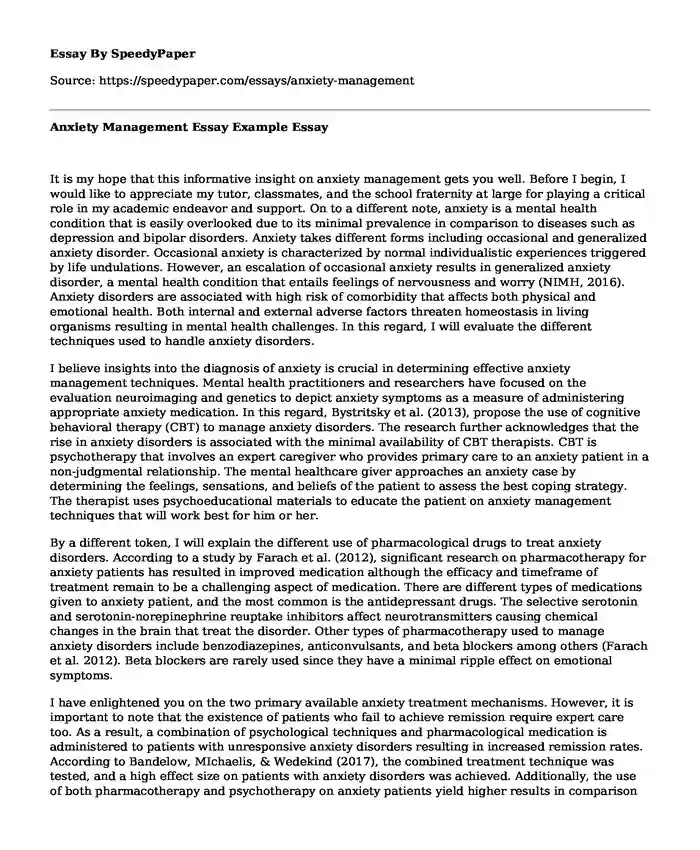
| Type of paper: | Speech |
| Categories: | Anxiety disorder Psychological disorder |
| Pages: | 3 |
| Wordcount: | 761 words |
It is my hope that this informative insight on anxiety management gets you well. Before I begin, I would like to appreciate my tutor, classmates, and the school fraternity at large for playing a critical role in my academic endeavor and support. On to a different note, anxiety is a mental health condition that is easily overlooked due to its minimal prevalence in comparison to diseases such as depression and bipolar disorders. Anxiety takes different forms including occasional and generalized anxiety disorder. Occasional anxiety is characterized by normal individualistic experiences triggered by life undulations. However, an escalation of occasional anxiety results in generalized anxiety disorder, a mental health condition that entails feelings of nervousness and worry (NIMH, 2016). Anxiety disorders are associated with high risk of comorbidity that affects both physical and emotional health. Both internal and external adverse factors threaten homeostasis in living organisms resulting in mental health challenges. In this regard, I will evaluate the different techniques used to handle anxiety disorders.
I believe insights into the diagnosis of anxiety is crucial in determining effective anxiety management techniques. Mental health practitioners and researchers have focused on the evaluation neuroimaging and genetics to depict anxiety symptoms as a measure of administering appropriate anxiety medication. In this regard, Bystritsky et al. (2013), propose the use of cognitive behavioral therapy (CBT) to manage anxiety disorders. The research further acknowledges that the rise in anxiety disorders is associated with the minimal availability of CBT therapists. CBT is psychotherapy that involves an expert caregiver who provides primary care to an anxiety patient in a non-judgmental relationship. The mental healthcare giver approaches an anxiety case by determining the feelings, sensations, and beliefs of the patient to assess the best coping strategy. The therapist uses psychoeducational materials to educate the patient on anxiety management techniques that will work best for him or her.
By a different token, I will explain the different use of pharmacological drugs to treat anxiety disorders. According to a study by Farach et al. (2012), significant research on pharmacotherapy for anxiety patients has resulted in improved medication although the efficacy and timeframe of treatment remain to be a challenging aspect of medication. There are different types of medications given to anxiety patient, and the most common is the antidepressant drugs. The selective serotonin and serotonin-norepinephrine reuptake inhibitors affect neurotransmitters causing chemical changes in the brain that treat the disorder. Other types of pharmacotherapy used to manage anxiety disorders include benzodiazepines, anticonvulsants, and beta blockers among others (Farach et al. 2012). Beta blockers are rarely used since they have a minimal ripple effect on emotional symptoms.
I have enlightened you on the two primary available anxiety treatment mechanisms. However, it is important to note that the existence of patients who fail to achieve remission require expert care too. As a result, a combination of psychological techniques and pharmacological medication is administered to patients with unresponsive anxiety disorders resulting in increased remission rates. According to Bandelow, MIchaelis, & Wedekind (2017), the combined treatment technique was tested, and a high effect size on patients with anxiety disorders was achieved. Additionally, the use of both pharmacotherapy and psychotherapy on anxiety patients yield higher results in comparison to placebo controls. Therefore, I would strongly advise that patients who suffer from anxiety disorder to seek both CBT and medical attention for a quick response.
I will conclude by reinstating the importance of anxiety management techniques in attaining a healthy economy. The effects of anxiety on individual productivity have the potential of deterring economic growth and development. In this regard, I encourage patients with anxiety disorders to seek expert care to prevent the escalation of the mental health condition through various anxiety management strategies. The different anxiety management techniques are determined about factors such as biological mechanisms of anxiety. Anxiety affects different neurotransmitters negatively resulting in the deregulation of brain states and the mental health condition. However, the good news is that different management techniques such as psychotherapy and pharmacotherapy significantly reduce anxiety disorders.
References
Bandelow, B., Michaelis, S., & Wedekind, D. (2017). Treatment of anxiety disorders. Dialogues in Clinical Neuroscience, 19(2), 93-107.
Bystritsky, A., Khalsa, S., Cameron, M., & Schiffman, J. (2013). Current diagnosis and treatment of anxiety disorders. A Peer-Reviewed Journal for Managed Care and Hospital Formulary Management, 38(1), 30-57.
Farach, F., Pruitt, L., Jun, J., Jerud, A., Zoellner, L., & Roy-Byrne, P. (2012). Pharmacological treatment of anxiety disorders: current treatments and future directions. Journal of Anxiety Disorders, 26(8), 833-43.
NIMH (2016). Generalized Anxiety Disorder: When Worry Gets Out of Control. National Institute of Health Publication. Retrieved from https://www.nimh.nih.gov/health/publications/generalized-anxiety-disorder-gad/generalized-anxiety-disorder_124169.pdf
Cite this page
Anxiety Management Essay Example. (2022, Oct 14). Retrieved from https://speedypaper.net/essays/anxiety-management
Request Removal
If you are the original author of this essay and no longer wish to have it published on the SpeedyPaper website, please click below to request its removal:
- Ethics Essay Example
- Saudi Business - Consumer Good Company, Free Essay on Sustainability
- Free Essay: Dark Innocent Sides of the World in William Blake's Poems
- HRM Essay Example about Absence Culture
- Dissertation Abstract Example: How, When and Why Kuwait Come to Be a British Protectorate?
- Essay Sample on Smoking on the Titanic
- Paper Example. Piano Concerto No. 5 in E Flat, Op. 73, "Emperor"
Popular categories




